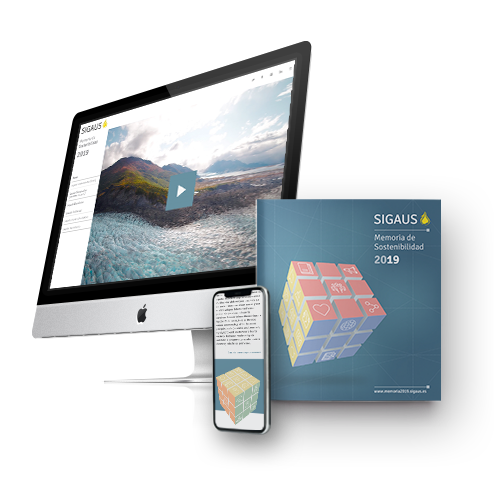49. Cabecera noticia Memoria 2019
Education as a legacy for the future, the main theme of the new SIGAUS Sustainability Report
The Entity has published its annual report in which it analyses its main contributions to society in different areas (including environmental, economic, social or technological, among others) during the past year. In this edition, the Report uses education as the main thread, this being SIGAUS’ key contribution to society beyond its environmental work. The document, which has been presented digitally through a specific micro-site, is divided into six “legacies” that include the reflections of various experts in the field of education.
20-07-2020

24. Párrafo noticia Memoria 2019_1
2019 has been the year of consolidation of the SIGAUS Environmental Classroom project, which is why the Entity wanted to highlight the importance of education and training as instruments of progress for society, making them the main topics of its 2019 Sustainability Report. In this way, the Entity has presented the work carried out last year beyond the fulfilment of its environmental goals, through a ‘legacy of value’ for future generations and for sustainable development.
In order to capture this social commitment, SIGAUS has had the help of various education experts for its Report, including José Carlos Gómez Villamandos (President of the Conference of Rectors of Spanish Universities), Jorge Jesús Gómez Sanz (Deputy Rector for Technologies and Sustainability from the Complutense University of Madrid) and Belén Arcones (General Director of the IMF Business School), who have contributed their reflections on the role of education at this time and the challenges that lie ahead.
32. Párrafo cita Noticia Memoria 2019
“
The Report analyses SIGAUS’ activity in 2019 through six legacies that include the reflections of various experts in the field of education.
„
Education has also been the main topic in the section of the Report dedicated to the SDGs (Sustainable Development Goals), agreed by the UN in 2015. The axis of this section has been SDG 4 on “Quality education”, in which the contribution of the SIGAUS Environmental Classroom enables the “promotion of lifelong learning opportunities for all” and the “considerable increase in the number of young people and adults who acquire the necessary skills, in particular technical and professional, to access employment, decent work and entrepreneurship”, as required by the UN in said Goal. Likewise, the Report reflects the contributions of SIGAUS to SDGs 8 (relating to sustained, inclusive and sustainable economic growth), 12 (on sustainable consumption and production patterns) and 16 (relating to just, peaceful and inclusive societies)
100%-digital Report
For the first time ever, the report has been fully presented in digital format through the micro-site https://memoria2019.sigaus.es/, in which SIGAUS details the activity carried out in 2019 in a highly visual manner, through charts, animations, computer graphics and other content. The homepage features emotional video content which, in addition to summarising SIGAUS’ main contributions in 2019, also provides a reflection on the importance of protecting the environment and our surroundings as the legacy that will remain for future generations. On a technical level, the website has been optimised to enable proper visualisation from all types of systems, both desktop computers and mobile devices.
24. Párrafo noticia Memoria 2019_2
As a standout element, the Report includes an interactive Rubik's Cube, which is synonymous with learning and intellectual activities, to illustrate the importance of training and education. Each of the cube’s faces represents the different areas in which SIGAUS takes action, and which are defined as “legacies” in the Report. Visible on the home page and in the heading of each of these legacies, the cube can be rotated to access the different sections of each of these six main areas: cooperative, sustainability, economic, environmental, social and informative legacy, as well as technological.
Similarly to the Reports published since 2013, this edition has been prepared under the Global Reporting Initiative (GRI) guidelines, the most internationally recognised standard for this type of document, applying its most recent methodology, which was updated last May. Likewise, the content of the report has been verified by an independent consultancy company, responsible for carrying out an in-depth review thereof.